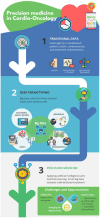Cardio oncology: Digital innovations, precision medicine and health equity
- PMID: 36407451
- PMCID: PMC9669068
- DOI: 10.3389/fcvm.2022.951551
Cardio oncology: Digital innovations, precision medicine and health equity
Abstract
The rapid emergence of cardio-oncology has resulted in a rapid growth of cardio-oncology programs, dedicated professional societies sections and committees, and multiple collaborative networks that emerged to amplify the access to care in this new subspecialty. However, most existing data, position statements and guidelines are limited by the lack of availability of large clinical trials to support these recommendations. Furthermore, there are significant challenges regarding proper access to cardio-oncology care and treatment, particularly in marginalized and minority populations. The emergence and evolution of personalized medicine, artificial intelligence (AI), and machine learning in medicine and in cardio-oncology provides an opportunity for a more targeted, personalized approach to cardiovascular complications of cancer treatment. The proper implementation of these new modalities may facilitate a more equitable approach to adequate and universal access to cardio-oncology care, improve health related outcomes, and enable health care systems to eliminate the digital divide. This article reviews and analyzes the current status on these important issues.
Keywords: artificial intelligence (AI); cardio-oncology; digital technology; health disparities; health equity (MeSH); precision medicine.
Copyright © 2022 Sadler, Okwuosa, Teske, Guha, Collier, Moudgil, Sarkar and Brown.
Conflict of interest statement
The authors declare that the research was conducted in the absence of any commercial or financial relationships that could be construed as a potential conflict of interest.
Figures

References
Publication types
LinkOut - more resources
Full Text Sources

